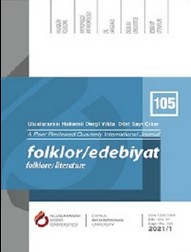Yedi Düvelden Yedi Başa Salur Kazan’ın Yedi Başlı Ejderhayı Öldürdüğü Boyda Mimetik Arzu
The Seven Great Powers to Seven Head: The Mimetic Desire in the Narrative of Salur Kazan Kills the Seven Headed Dragon
Author(s): M. Emir İlhanSubject(s): Customs / Folklore, Studies of Literature, Turkish Literature
Published by: Uluslararası Kıbrıs Üniversitesi
Keywords: mimesis; Salur Kazan; mimetic desire; dragon; bellicosity;
Summary/Abstract: In this study the narrative/epic/story of Salur Kazan killing the dragon is approached through René Girard’s concept of mimetic desire. The narrative, which started with the capture of Aras and Kars Castles, continues with a hunting adventure. Salur Kazan, who goes on a battle together with his governors, wants to hunt alone after a while. He, alone, cannot find a prey until the darkness falls. He prays to God not to return to his homeland without hunting. His prayer is fulfilled, and a dragon appears before him. The story ends with the fight against the dragon and a celebration. The story shows that the journey and adventure of Salur Kazan, who summons the dragon he will encounter with pray, cannot be considered just as an epic prowess. Through mimetic analysis, it is noted that the mimetic power of the dragon is force, leadership, and the spread of fear. Salur Kazan has the desire to have those represented in the dragon with a mimetic desire, in other words, in the representation of Salur Kazan, it is claimed that the story/storytellers wanted to meet the dragon and kill him as a result of mimetic desire. The desire to be tested which caused Salur Kazan to encounter the dragon and the desire to kill him come into existence with an imitation of the dragon. In fact, the desire is to be (like) the dragon, to attain the dragon and the power, force, and dominance possessed by the dragon. It seems like that the stimulus and/or enemy of this imitation relationship which is based on warfare is the dragon. However, it is claimed that the dragon is the natural stimulus of those who construct and transmit the narrative in Salur Kazan or its representation.
Journal: Folklor/Edebiyat
- Issue Year: 27/2021
- Issue No: 105
- Page Range: 15-28
- Page Count: 14
- Language: Turkish

